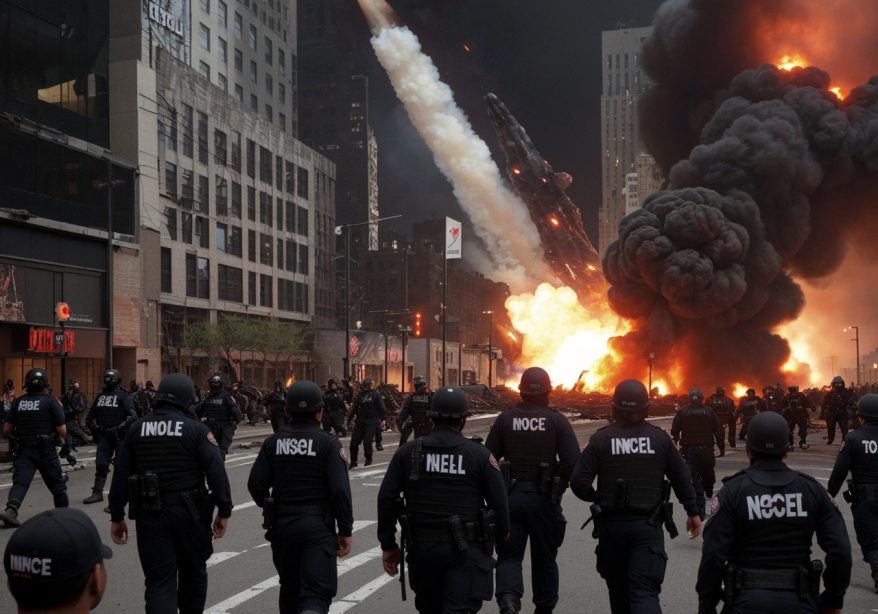The holiday season should be a time of joy, but this year, the festive spirit is shattered by the sound of an explosion. As you wander through the bustling streets of New York City, the world around you erupts into chaos. A bomb, planted by radical incels, has torn through the heart of the city, leaving devastation in its wake. Sixteen lives are lost, and as the smoke clears, it becomes evident that this is not an isolated incident—it’s the beginning of a terrifying new wave of insurgency, driven by a twisted ideology of hate and resentment.
Scenario Description:
In this scenario, a dangerous alliance forms between radical incels—individuals who identify as “involuntarily celibate” and harbor deep resentment towards women and society—and extremist jihadists. Both groups share a common goal: the establishment of a society where women are subjugated and stripped of their rights, much like the dystopian world depicted in The Handmaid’s Tale. Fueled by a toxic mix of misogyny, entitlement, and extremist ideology, these groups band together to wage a violent campaign against society.
The combination of incel ideology with jihadist tactics creates a hybrid threat that is both ideologically driven and strategically sophisticated.
The seeds of this radicalization are sown in the dark corners of the internet, where propaganda spreads like wildfire. On platforms like TikTok, videos promoting the incel ideology go viral, drawing in disillusioned young men who feel alienated and rejected. These videos often feature armchair psychologists offering pseudoscientific explanations for their struggles, reinforcing the belief that society—and particularly women—are to blame for their woes.
The propaganda also encourages extreme confrontational behavior, urging followers to react aggressively to any perceived or real rejection, whether in romantic pursuits or friendships. This mentality turns ordinary social interactions into battlegrounds, where hostility and violence become acceptable responses to personal frustrations.
As the movement grows, radical incels become emboldened, escalating from online harassment to real-world violence. The Christmas bombing in New York is just the beginning, as similar attacks are carried out in cities around the world. Governments are forced to deploy military forces to counter the threat, but the insurgency proves difficult to contain. The ideology continues to spread, recruiting more followers and destabilizing communities.
Impact on Society:
The rise of the incel insurgency has profound implications for society. Public spaces become targets for violence, instilling fear in everyday activities. The psychological toll is immense, as people become increasingly paranoid and distrustful of strangers, wondering if the person next to them might be a radicalized incel.
Social media platforms come under intense scrutiny, as their role in facilitating the spread of extremist propaganda is exposed. Governments push for stricter regulations, but the decentralized nature of the internet makes it difficult to completely shut down the sources of radicalization. Efforts to counter the ideology with positive messaging and education are met with mixed results, as the movement’s appeal to those who feel disenfranchised remains strong.

The alliance between incels and jihadists also presents a new challenge for counterterrorism efforts. The combination of incel ideology with jihadist tactics creates a hybrid threat that is both ideologically driven and strategically sophisticated. Traditional law enforcement methods are insufficient to address this new breed of insurgency, leading to calls for more comprehensive approaches that tackle the root causes of radicalization.
Mitigation and Prevention:
Mitigating the threat posed by radical incels requires a multi-faceted approach that addresses both the ideological and psychological drivers of the movement. One of the most effective strategies is to promote self-discipline and personal growth as alternatives to the toxic mindset of blame and resentment that fuels the incel ideology. Encouraging young men to focus on improving themselves—whether through education, fitness, or developing meaningful relationships—can help to redirect the anger and frustration that might otherwise lead them down a path of radicalization.
Educational programs that teach emotional intelligence and conflict resolution skills can also play a crucial role in preventing the spread of confrontational behavior. By helping individuals to better understand and manage their emotions, these programs can reduce the likelihood of extreme reactions to perceived rejection.
Social media platforms must take greater responsibility for the content they allow to circulate. This includes implementing stronger moderation practices to remove extremist propaganda and providing resources for users who may be vulnerable to radicalization. Partnerships with mental health organizations can also help to identify and support individuals who are at risk of being drawn into the incel movement.
Finally, community engagement is key. Local organizations, religious groups, and schools can work together to create environments that foster inclusivity and respect, making it harder for extremist ideologies to take root. By building strong, supportive communities, we can reduce the appeal of radicalization and offer healthier alternatives to those who might otherwise be drawn into the incel insurgency.

